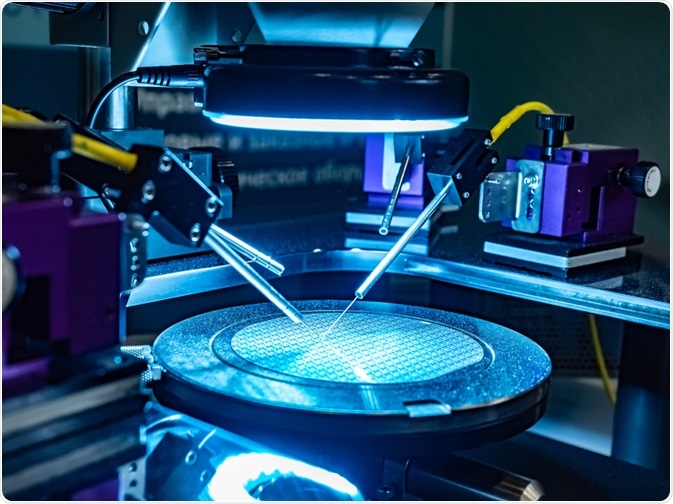Lab automation processes have been implemented in institutions across the globe to benefit from decreasing the necessity for human staff to perform repetitive tasks and implementing automated machine processes instead.

Image Credit: FOTOGRIN/Shutterstock.com
Since the 1980s, advancements in lab automation technology has been utilized to save costs and time associated with running tests and enhancing the quality and consistency of the work through removing human error and standardizing procedures. Automation has been established to enhance patient, worker satisfaction, and safety.
As technology has rapidly developed, the capability to automate more processes has increased, with many implementing the approach of total automation. However, automation is not as simple as replacing humans with machines, it presents many challenges.
The skill gap in technology
Technological advances require staff to learn how to use new sophisticated software that manages laboratory automation. Managing test orders, handling the routes taken by specimens, overseeing the consistency of quality of tests, and identifying machine failures or deviation from standard protocol are tasks that are handled by software designed to automate the machinery performing laboratory tasks.
Scientists monitoring the software need to be trained in how to use it, as technology continues to advance, the need for training increases. Also, the task of monitoring software may be quite different from the manual tasks that lab technicians are accustomed to and the retraining to use software can present a major challenge to automation.
Learning curve
The need for developing new skills is the learning curve associated with implementing automation processes. Lab technicians are trained in handling specimens rather than software. There are different skill sets involved in managing software such as; decision making regarding the automated test results, monitoring the new equipment, conducting maintenance procedures, and performing quality control checks.
There is a period of time required for lab technicians to become accustomed before the system of automated technology and staff become fully optimized.
Skill loss
An important consideration in laboratory automation that is often not considered at first is the possibility that it may lead to a loss of knowledge and skills. As new technology emerges and replaces the old, the skills and knowledge associated with the old systems rapidly become redundant and eventually lost.
However, previous approaches to testing are valuable in providing information on the mechanistic aspects of the process and knowledge for troubleshooting. Previous technical knowledge is also often called upon for troubleshooting of problems with new equipment, therefore these skills must be maintained.
Initial technological glitches
Errors within new automated systems are not always simple to detect. While some occur suddenly and cause obvious effects on the system, others are more subtle and can increase over time, causing inaccuracies in procedures which can ultimately lead to a decrease in quality or even false data.
To prevent issues like this from occurring, staff require training in tracking and monitor systems to recognize faults at the earliest and to act before tests are significantly affected. This is a new skill set that lab technicians must be trained in where previously the tests would have been performed manually.
In addition, staff need to switch their mindset when transferring from the role of a technician manually handling samples to operating the software systems.
Sources:
- Bourbeau, P., and Ledeboer, N. (2013). Automation in Clinical Microbiology. Journal of Clinical Microbiology, 51(6), pp.1658-1665. https://www.ncbi.nlm.nih.gov/pmc/articles/PMC3716104/
- Genzen, J., Burnham, C., Felder, R., Hawker, C., Lippi, G., and Peck Palmer, O. (2018). Challenges and Opportunities in Implementing Total Laboratory Automation. Clinical Chemistry, 64(2), pp.259-264. https://www.ncbi.nlm.nih.gov/pubmed/28971983
- Hawker, C. (2007). Laboratory Automation: Total and Subtotal. Clinics in Laboratory Medicine, 27(4), pp.749-770. https://www.sciencedirect.com/science/article/pii/S0272271207000856
- Seaberg, R., Stallone, R., and Statland, B. (2000). The Role of Total Laboratory Automation in a Consolidated Laboratory Network. Clinical Chemistry, 46(5), pp.751-756. https://academic.oup.com/clinchem/article/46/5/751/5641489
Further Reading